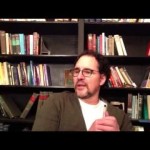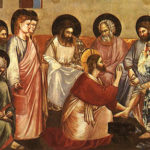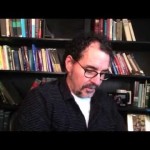We run our website the way we wished the whole internet worked: we provide high quality original content with no ads. We are funded solely by your direct support. Please consider supporting this project.

Why Did Jesus Curse a Barren Fig Tree?
While no one argues that the NT advocates violence explicitly, many allege that some passages reflect violent attitudes toward outsiders, and especially toward non-believing Jews, while others detect an element of violence in some of Jesus’ teachings and behavior. Some scholars argue that this violent aspect of the NT laid the groundwork for later Christian violence when the church began to embrace the power of the state in the fourth century. I am dealing with a few episodes from the life of Jesus that have often been used to argue for violent acts. Today I want to look at the cursing of the barren fig tree.
Both Matthew and Mark recount an episode in which Jesus cursed a fig tree because it bore no fruit and Jesus was hungry (Mt 21: 18-22, Mk 11:12-3, 21-5). What makes Jesus’ only destructive miracle even more puzzling is that Mark informs us that, “it was not the season for figs” (v. 13). According to some, this story represents Jesus engaging in a violent attack on the tree that make him appear cruel. One writer goes so far as to speculate that Jesus must have violently cursed this tree “in a petty fit of low blood sugar or something like that.”[1] I submit that if we read these accounts in context and with any degree of charity, it becomes clear that Jesus did not curse this tree in a fit of childish, cruel, or petty anger.
Fig trees are frequently used to symbolize either spiritual fruitfulness or unfruitfulness in the OT (Isa 28:4; Jer 8:13; 24:1-10; 29:17; Hos 2:12; 9:10,16-7; Mic 7:1). In this light, Jesus’ cursing of the barren fig tree should be understood as a symbolic judgment on the nation of Israel. This is made all the more clear from the fact that Mark interjects Jesus’ cleansing of the Temple (See post), which was itself a symbolic judgment on the corrupt leaders of Israel, between Jesus’ curse of the fig tree and the time when the disciple’s notice that the tree had withered. Moreover, in both Gospels the cursing is followed by a confrontation between Jesus and Jewish authorities that concludes with Jesus telling two parables that indict these leaders (Mt 21:13-46; Mk 11:27-33; 12:-1-12). By cursing the tree, Jesus is acting out a parable as God’s spokesperson against Israel.
On top of this, I submit that there is another dimension to the symbolic destructive action of Jesus in this episode. The NT reflects the widespread Jewish apocalyptic expectation that the coming of the Messiah at the end of the age would remove the curse on creation and restore it to what God originally intended it to be (e.g. Acts 3:21; Rom 8:19-22; Col 1:18-20; 2 Pet 3:13). Moreover, in apocalyptic thought, barren or infected fruit trees were sometimes understood to reflect the corrupting influence of fallen angelic powers, and barren fig trees in particular had in some writings become symbols of this curse. In this light it is easy to interpret Jesus’ cursing of the barren fig tree as not only a symbolic pronouncement of judgment on Israel, but also as a symbolic judgment on Satan’s curse on the earth. And in cursing the curse, as it were, Jesus was once again presenting himself as the Messiah who had come to vanquish Satan (Heb 2:14; 1 Jn 3:8) and to restore God’s good creation.
[1] J. H. Ellens, ed., The Destructive Power of Religion: Violence in Judaism, Christianity, and Islam, Volume 3 (Westport, CT: Praeger, 2004), 16.
Photo credit: Jackal1 via Visual Hunt / CC BY-ND
Category: General
Tags: Jesus, Non-Violence
Topics: Enemy-Loving Non-Violence
Related Reading

The Rorschach Test
The choices we make will either increase or decrease our ability to recognize light when we see it. As we choose goodness, we increase our capacity for goodness. What do you see when you read the Bible or look at God or interact with others? Everything is a Rorschach test to some extent, revealing the light…

What About the Harsh Words of Paul? A Response to Paul Copan (#4)
This post is my fourth response to a talk given by Paul Copan at the Evangelical Theological Society in November in which he raised a number of objections to Crucifixion of the Warrior God. A major part of Copan’s critique centered on my claim that the love of God that is revealed on the cross,…

What makes the claim that Jesus rose from the dead unique?
Question: What makes the story of Jesus’ resurrection different from other pagan resurrection stories, such as those surrounding the Egyptian god Osiris? Answer: In Lord or Legend? (and more academically, The Jesus Legend), Paul Eddy and I address this, and many other, objections to faith in Jesus. I encourage you to check either of these…

Living Incarnationally
The Christian faith is centered on the belief that in Jesus Christ God became a human being. This is commonly referred to as the doctrine of the incarnation. It means that in Jesus, God became embodied. God left the blessed domain of heaven, was born in Bethlehem, and took on our humanity that we might…

Drum Roll Please: Greg’s Final Critique of Bart Ehrman’s Article
This is the ninth and final of several videos Greg put together to refute Bart Ehrman’s claims published in the article What Do We Really Know About Jesus? Thanks for hanging in there for this last one. I know it was a long wait, but the holidays got inordinately busy for Greg. In this segment, Greg talks…

Finding an Alternative Jesus
The “Newly Discovered” Jesus One of the most common, and most disturbing, refrains heard in the media’s coverage of contemporary radical views of Christ is that New Testament scholars have recently “discovered” new sources of information about Jesus that contradict the Bible’s own view of Jesus. It is claimed that works such as the Gospel…
